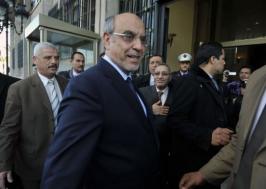CAIRO: Letting the pound’s value fall could help the Egyptian economy in the coming months by bolstering export and tourism revenues threatened by worldwide recession, Mohamed Taymour, chairman of the brokerage Pharos Holding, said Monday at a workshop sponsored by the Arab African International Bank (AAIB).
“It’s not all bad if the Egyptian pound recedes a little bit, he said.
Devaluation could worsen already-worrisome inflation, he noted, but the accompanying boost in exports and tourism would likely outweigh the costs – particularly if commodity prices continue to slip. “It would be a mixed blessing, really.
A “snapshot of Egyptian economy shows it is essentially strong, Taymour said. Exports have grown between 30 and 35 percent over the last few years, the balance of payments is in a notable surplus and international reserves are soaring, he said.
“But we do have a problem, a very serious one, which is inflation, Taymour said. Current rates, still above 20 percent, “are not acceptable by any standard, he said, adding that Egypt’s budget deficit is also worrisome.
A drop in investment from abroad and a dry-up of foreign credit lines, triggered by the recent financial maelstrom, could put more pressure on the pound, he said. “This is something we have to be aware of and ready for.
Since the spectacular collapse of the American financial giant Lehman Brothers in early September, the pound has slumped from around 5.35 to the dollar to trade at 5.58 as of late Monday. In August, it was valued at LE 5.29 to the US dollar.
Panelists of the workshop, titled “A New Financial World: Challenges and Opportunities for the Region, appeared far more preoccupied with challenges than opportunities as they discussed the financial crisis.
“This is the workshop of gloom, announced Arthur Koops, head of risk management at AAIB.
“[The financial crisis] is like a football match. We have barely finished the first half, we still have to play the second, said Mohamed Sammakia, president of the Middle East Division at UBS London.
In the wake of recent bank failures and buyouts, the world is moving toward monopoly among financial service providers, Sammakia said. “This is a pretty pessimistic view, but I’ve tried to find something more optimistic and quite frankly I can’t, he said.
Taymour disagreed that this will persist over a longer term, noting that France and other countries nationalized their banks in the 80s only to resell them to the public later.
Gulf-area sovereign wealth funds (SWFs), a big source of cash for many Egyptian sectors, will also have less money to toss around, Sammakia said.
“Every $25 deterioration in oil prices wipes out $100 billion in income for these sovereign wealth funds, he said.
Despite the generally dour tone, Koops managed to rouse a few laughs before his speech on his major lessons for bankers.
“I went to buy a toaster and was given a bank, he quipped, before quickly adding a “more sophisticated joke: “As you know in accounting, assets are on the left and liabilities on the right, he said. “The problem with Lehman Brothers is there are no assets left and the liabilities aren’t right.

